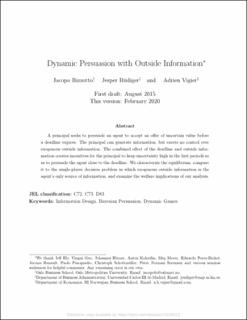| dc.contributor.author | Bizzotto, Jacopo | |
| dc.contributor.author | Rudiger, Jesper | |
| dc.contributor.author | Vigier, Adrien Henri | |
| dc.date.accessioned | 2023-06-30T13:20:27Z | |
| dc.date.available | 2023-06-30T13:20:27Z | |
| dc.date.created | 2020-06-18T09:30:46Z | |
| dc.date.issued | 2021 | |
| dc.identifier.issn | 1945-7669 | |
| dc.identifier.uri | https://hdl.handle.net/11250/3074739 | |
| dc.description.abstract | A principal seeks to persuade an agent to accept an offer of uncertain value before a deadline expires. The principal can generate information, but exerts no control over exogenous outside information. The combined effect of the deadline and outside information creates incentives for the principal to keep uncertainty high in the first periods so as to persuade the agent close to the deadline. We characterize the equilibrium, compare it to the single-player decision problem in which exogenous outside information is the agent's only source of information, and examine the welfare implications of our analysis. | en_US |
| dc.language.iso | eng | en_US |
| dc.publisher | American Economic Association | en_US |
| dc.title | Dynamic Persuasion with Outside Information | en_US |
| dc.type | Journal article | en_US |
| dc.type | Peer reviewed | en_US |
| dc.description.version | acceptedVersion | en_US |
| dc.source.pagenumber | 18 | en_US |
| dc.source.volume | 13 | en_US |
| dc.source.journal | American Economic Journal: Microeconomics | en_US |
| dc.source.issue | 1 | en_US |
| dc.identifier.doi | 10.1257/mic.20180141 | |
| dc.identifier.cristin | 1816066 | |
| cristin.ispublished | true | |
| cristin.fulltext | original | |
| cristin.qualitycode | 2 | |
